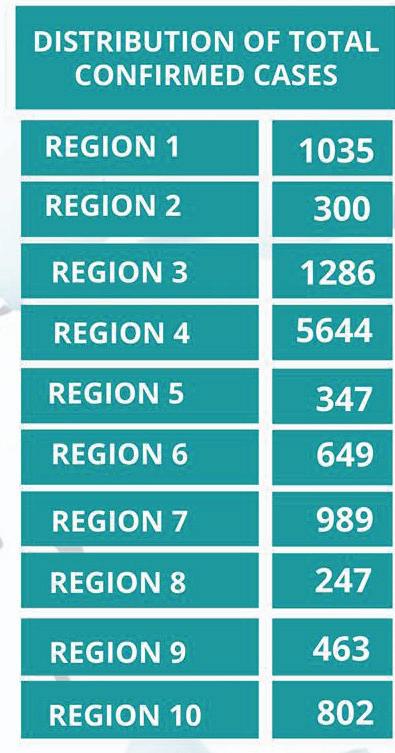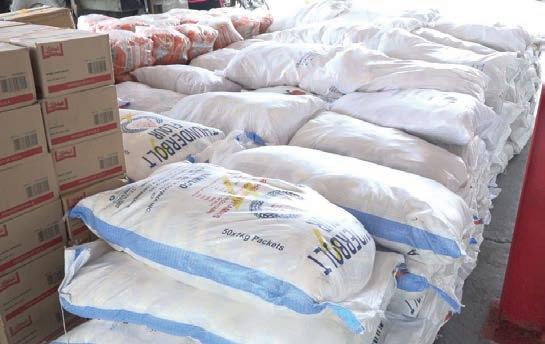
8 minute read
Anonymous call leads P
EMPOWERING COMMUNITIES TO TAKE THE LEAD IN PROMOTING AND SAFEGUARDING TRADITIONAL KNOWLEDGE
To continue our discussion on the draft Traditional Knowledge National Action Plan (TKNAP), we will now shift our focus to activities within Indigenous communities. Clearly, it is in the best interest of each Indigenous community in Guyana to take a lead in tackling the issues related to promoting the continued use and safeguarding of their traditional knowledge and practices. Communities, though, may need support from external parties for capacity building and access to funds that would support such community actions.
The actions under a third objective of the TKNAP would address such matters. How so?
The Darwin Initiative, “Integrating traditional knowledge into national policy and practices” project has been training community members in participatory video. Some of the participants then served as community researchers, supporting project activities in their community.
Participatory video is a methodology that promotes the involvement of community members in creating short videos that are focused on topics of importance to them. It encourages conversations and dialogue during the process of making the video, while interviewing community members, and when the final video is shown for all to see. This methodology leads to what the project has been promoting as ‘community owned solutions’ - an approach which positions local people as being the best-placed to come up with solutions to matters related to their development and conservation challenges. It builds confidence and pride, and helps to strengthen communitybased action.
In efforts to promote the use of participatory video and community-owned solutions, it was been recommended that more training opportunities be made available to Indigenous community members, particularly youths. A training manual and accompanying tutorial videos have been developed through this project, and they can be used to promote and facilitate this purpose. As more persons are trained, it would be good to establish a network of youth participatory researchers who can support their community and each other.
Sharing experiences and best practices between communities is another way of supporting villages that are looking for examples of ways to address their challenges, or ways to improve development and conservation. Referred to as “peer to peer knowledge exchange”, this sharing between communities involves community researchers taking the lead in arranging to visit other communities to share their knowledge, skills and experiences. The participatory videos and community-owned solutions are the focus of these exchanges; they are used to learn from each other, and inspire people to come up with their own ideas to tackle an issue.
Videos are an excellent way for communities to document different aspects of their traditional knowledge. Interviewing people in the community, particularly elders, to document livelihood practices, stories/folklore, songs, practices related to food preparation, craft-making and much more can be safely stored within the communities, and be made available to future generations that are helping to safeguard traditional culture and practices.
As Sydney Allicock once said, “Having these documented from our communities and shared amongst ourselves serves as a reminder of the knowledge that we have, and could lose with the changing times. It also reminds us that we may have the answer or answers to some of the questions being asked”.
In next week’s article, we will continue to share with you information based on a drafted Traditional Knowledge Action Plan (TKNAP) for Guyana. If you would like to learn more about some of the work that has been done by the project in communities, please visit the following website: https:// cobracollective.org/tag/darwin/.
Also, how do you feel about traditional knowledge and the role it plays in conservation? What do you think about a Traditional Knowledge National Action Plan for Guyana? Please share your thoughts via 592 650 6632 (WhatsApp or SMS only).
You can share your ideas and questions by sending letters to: “Our Earth, Our Environment”, C/O ECEA Programme, Environmental Protection Agency, Ganges Street, Sophia, GEORGETOWN, or email us at: eit.epaguyana@gmail.com. Follow us on Facebook and Instagram, and subscribe to our YouTube channel.
SUNDAY, APRIL 18, 2021 | GUYANATIMESGY.COM Police intercept car with ganja
Police from the Narcotics Branch and the Special Branch intercepted a car at Palmyra, Berbice, with a quantity of marijuana.
Reports are that acting on information received on Friday, ranks stopped a silver-grey motor car with registration number PTT 6996 at about 18:50h at Palmyra, Berbice.
The car, which was driven by a 30-year-old taxi driver of Stanleytown, New Amsterdam, was searched during which a white plastic barrel containing four bulky parcels of cannabis was found inside.
Just two days ago, a 56-year-old shopkeeper of Fifth Street, Prospect, East Bank Demerara (EBD), was arrested after he was found with a quantity of ganja during a Police raid on the EBD and in Georgetown.
A party of policemen carried out searches on several houses and persons in Norton Street, Bagotstown and at Fifth Street, Prospect, EBD, and a search was carried out on the home of the shopkeeper.
During the search, a black plastic bag containing a quantity of leaves, seeds, and stems were found stashed in the roof of the house, which is presently under construction.
The shopkeeper was told of the offence, arrested, and escorted to Providence Police Station, where the cannabis was weighed in his presence, amounting to 112 grams. (G9)
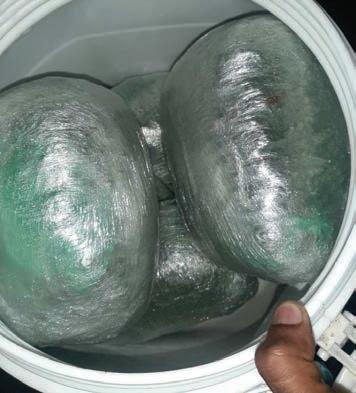
The marijuana that was found in the car at Palmyra, Berbice
Anonymous call leads Police to body on seashore
The body of an unidentified male was found in a decomposing state on the Cornelia Ida seashore, West Coast Demerara (WCD).
Based on reports received at about 06:30h, an unknown caller made contact with the Leonora Police Station and reported that the body was there.
Region Three Police Commander Errol Watts said the scene was visited by a Police Inspector along with a party of policemen where it was observed that the body was that of a male which looked like someone of mixed race, and about 45-year-old.
Following the discovery, the body was escorted to the Ezekiel Funeral Home at Best Village, WCD.
Further investigations are ongoing.
Just about a month ago, the decomposed body of a 40-year-old fisherman of Ocean View Uitvlugt, West Coast Demerara (WCD), was discovered at the Leonora Seawall.
The body of Sadar Sookdeo, also known as “Rakesh” was discovered at about 14:23h by a Police rank who was on duty in the area at the time.
Based on reports received, when the body was found it was clad in a pair of black boxer briefs. Following the discovery, a report was made and ranks attached to the Leonora station visited the scene.
Upon their arrival, the scene was processed and no mark of violence was seen on the man’s body. (G9)

SUNDAY, APRIL 18, 2021 | GUYANATIMESGY.COM Guyana records 268th COVID-19 death, 120 new cases
…some 500,000 citizens eligible for vaccine
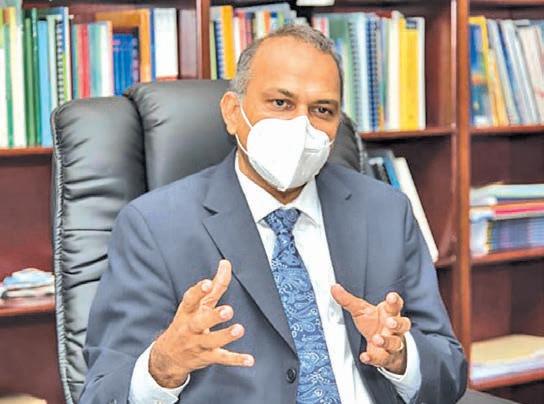
Health Minister Dr Frank Anthony
The Health Ministry on Saturday revealed that another person succumbed to the novel coronavirus, moving the death toll to 268.
An 81-year-old female from Region Four (Demerara-Mahaica) is the latest fatality. She died on April 16 while receiving care at a medical facility.
One day prior, four persons reportedly succumbed. They were an 81-year-old female from Region Three (Essequibo Islands-West Demerara), an 81-yearold female from Region Six (East Berbice-Corentyne); and two men from Region Four, aged 46 and 64.
Another 120 cases were confirmed on Saturday, raising the total confirmed positives to 11,762. However, active cases are 1332. These emerged after 1574 samples were collected and sent for testing.
In the medical facilities, 13 patients are in the Intensive Care Unit, 75 in institutional isolation, 21 in institutional quarantine and 1244 in home isolation. Some 10,161 of the 5952 males and 5810 females have recovered completely. To date, Guyana has tested 107,093 individuals.
New cases
A breakdown of new cases showed that seven were detected in Region Two (Pomeroon-Supenaam); 31 in Region Three (Essequibo Islands-West Demerara); 62 in Region Four (DemeraraMahaica); four in Region Five (Mahaica-Berbice); three in Region Six (East Berbice-Corentyne); one in Region Seven (CuyuniMazaruni) and two in Region Nine (Upper Takutu-Upper Essequibo).
Cases in Regions One (Barima-Waini), Eight (Potaro-Siparuni) and 10 (Upper Demerara-Berbice) still stand at 1035; 247 and 802.
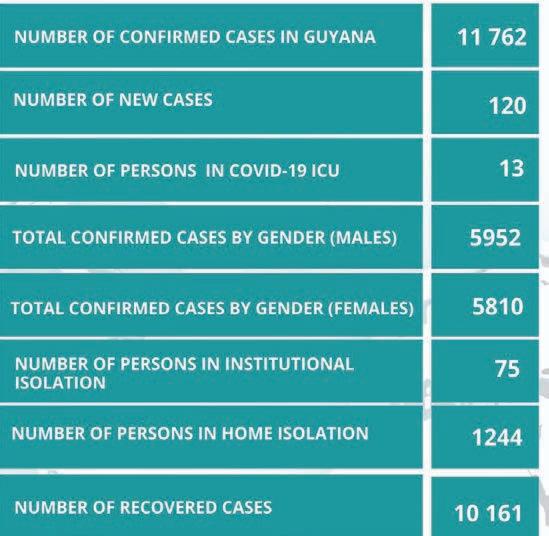
Vaccine
During the latest coronavirus update, Health Minister Dr Frank Anthony expressed that only the adult population is being vaccinated, since trials were not done for children. This translates to 500,000 of the local population.
“Because these vaccines are not available to children, we would have to take them out of the equation. None of these vaccines; the clinical trials were not done so we’re not using it in the 18 and below population. If we remove those persons, we’re probably looking at about 500,000 persons,” he outlined.
For this, Government is actively seeking to have enough vaccines to immunise this subset of people. Presently, more vaccines are needed to reach herd immunity.
“We aiming to get to herd immunity as close as possible and while we’re still a little short in terms of how much more we need, we continue to tirelessly pursue acquiring vaccines so that every adult in Guyana would be able to get vaccine.”
Right now, Region Nine is leading the vaccination campaign while there has been a slothful uptake in Region 10 (Upper TakutuUpper Essequibo).
On Friday, the public was reassured that the vaccines are safe and testimony is the thousands of people who would have taken their shots without any complications.
“The Ministry wishes to state clearly that the COVID-19 vaccines being administered are safe. We are hopeful influential political, faith and business leaders in Region Ten and other parts of the country
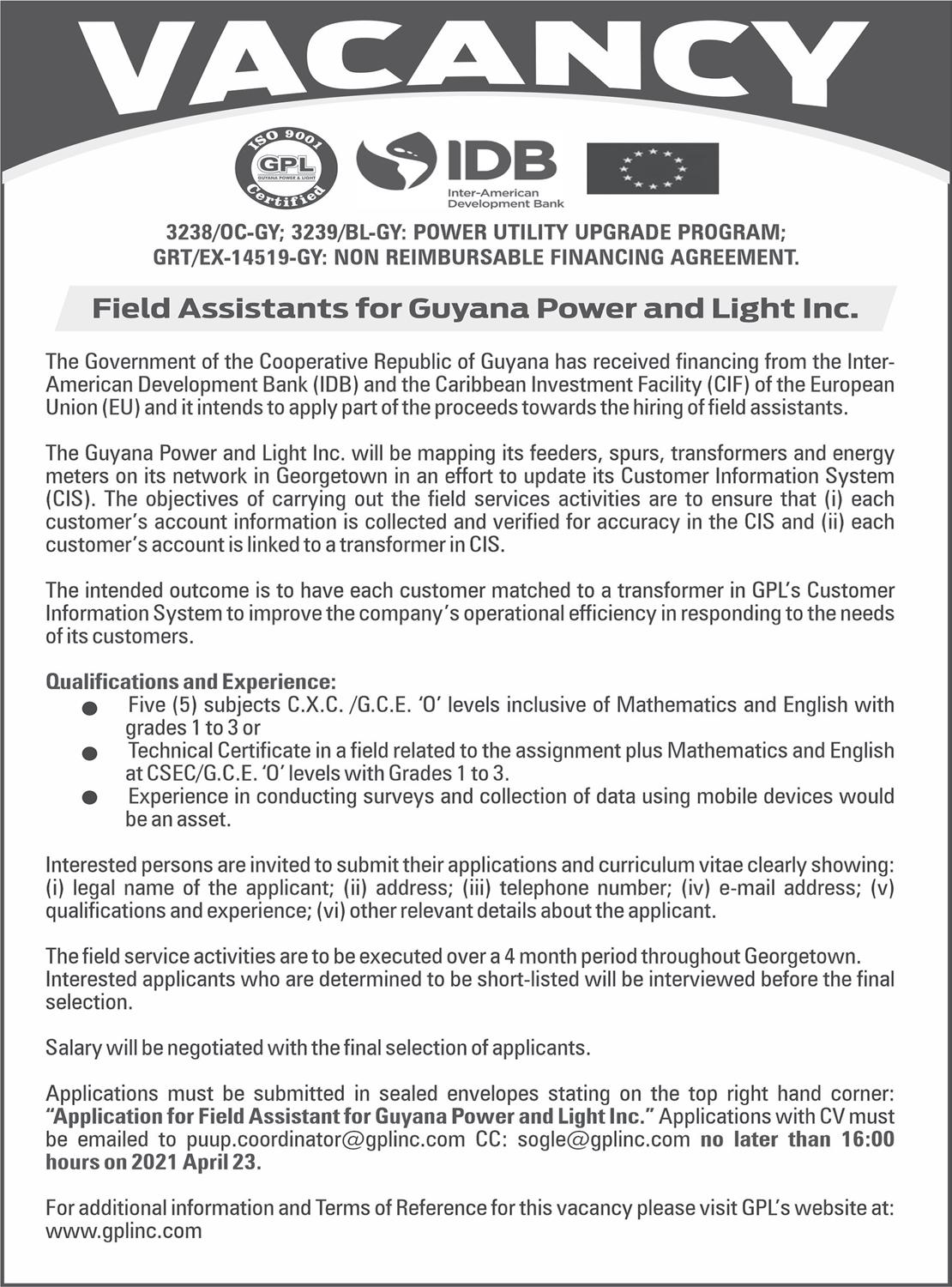
will use their good offices to encourage citizens to get vaccinated,” the Ministry said in a statement.
All Guyanese aged 18 and older were encouraged to visit a vaccination site in their community and get inoculated as soon as possible.
